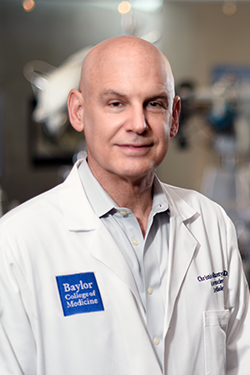
Dr. Christie M. Ballantyne, director of the Center for Cardiometabolic Disease Prevention at Baylor.
Everyone has a heart, but long-term heart health often depends on factors outside of our control. Genetics and socio-economic factors play a role in determining cardiovascular disease risk, as well as diet and activity. Dr. Christie M. Ballantyne, director of the Center for Cardiometabolic Disease Prevention at Baylor, noticed early in his career that the root causes of cardiometabolic disease frequently went unaddressed.
“As a resident working in the clinic years ago, I realized that we were just treating the advanced symptoms of cardiometabolic disease,” Dr. Ballantyne said. “That was frustrating to me. I could see we weren’t really treating what was driving the disease.”
Today, increases in obesity and diabetes are responsible for the surging rates of cardiovascular disease. In Harris County, where almost 70% of adults are overweight or obese, and more than 10% have diabetes, the situation is critical. In the Hispanic and Black communities, which comprise 65% of the county’s population, a high incidence of risk factors increases the likelihood of experiencing one or more of these conditions.
Recognizing the disparities in healthcare outcomes often experienced by people of color, the Center for Cardiometabolic Disease Prevention is leveraging Houston’s ethnic diversity to explore new ideas in care and prevention.
“We are partnering with community health educators within the Hispanic community in particular to see if there are ways we can improve diabetes management to prevent some of these disorders from appearing,” Dr. Ballantyne said.
With support from generous donors and grants, the Center’s clinical research has advanced understanding and treatment of cardiometabolic disease, as well as a person’s genetic risk factors.
“For several years, we’ve been working with the Human Genome Sequencing Center Clinical Laboratory to apply advances in genetics towards earlier diagnosis and treatment,” Dr. Ballantyne said. “Our award-winning HeartCare study investigates genes that influence risk for cardiovascular disease and related conditions.
“We discovered during this study that one of our tests didn’t work well when performed on Hispanic people, so now we are looking at improving how we use sequencing technologies to work for different racial and ethnic groups.”
To learn more about the Center’s efforts to improve cardiometabolic health, click here.
Your gift today will help make tomorrow's breakthroughs possible.